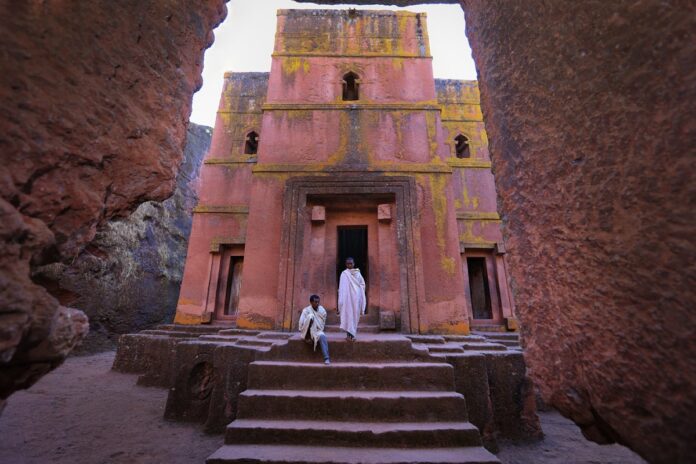Skift Take
The civil war is over, but Western government travel warnings are still there. If there’s going to be a recovery, tourism authorities need to focus their energy on getting those lifted. That’s going to require repeated messaging that the war is over.
Ethiopia’s tourism sector has been hit hard in the last two years by Covid and a brutal civil war, with spending down by more than $2 billion. The tourist sites and infrastructure have been spared, but the sector doesn’t have the confidence of governments, travelers and tour group operators that the conflict is over and the country is a safe destination.
For two years, Ethiopia has had an ethnic civil war largely fought between the Tigray People’s Liberation Front (TPLF) and the governments of Ethiopia and Eritrea. It started in November 2020 when the Ethiopian government sent troops into the northern Tigray region after prime minister Abiy Ahmed accused the TPLF of attacking a military base. The war was mostly concentrated in Tigray but did spill into parts of other regions like Amhara.
The conflict may have led to over 600,000 lives lost, according to the Financial Times. Millions of people have been displaced. The U.N. High Commissioner for Human Rights have accused Tigrayan forces of committing war crimes and “human rights abuses” and the Ethiopian government of committing “crimes against humanity.“
In November, the Tigrayan rebels and the Ethiopian government signed a peace deal to end hostilities.
Before the horrific war and the pandemic, the country drew over 800,000 tourists and spending amounted to $3.5 billion in 2019, according to the World Bank. A growing segment of tourists have been from the U.S., UK and Europe, according to Intrepid Travel East African General Manager Samuel Karani.
Popularity was rising so much that some of the country’s beautiful natural parks, churches, mountains and historic sites experienced overtourism. Visitation to the Gheralta mountains, for example, was becoming popular to the point that some of the historic churches experienced overcrowding, according to Mark Chapman, founder of Tesfa Tours, which has operated in Ethiopia since 2010.
In 2020, visitation dropped to 500,000 and spending fell by 35 percent to $2.28 billion, according to the World Bank. In the last two years, the country lost $2 billion thanks to the war and Covid, Ethiopia Tourism State Minister Sileshi Girma told Voice of America.
“A lot of tour operators stopped operating because nobody was earning any money,” said Chapman. “It was hard to survive these few years and keep paying overhead.”
The war prolonged any hopes of the return of tour groups since Covid. In March 2022, Intrepid Travel decided to hold off on offering tours even though traveler interest had resumed. Their tourist destinations and routes they used were “unready” and the war hadn’t settled down, said Karani.
Tourist sites and attractions are typically not spared in conflicts. The historic architecture of Aleppo suffered massive destruction during the Syrian Civil War.
Fortunately for Ethiopia, popular tourist sites like Lalibela that were caught in the conflict have been spared. Lalibela, a holy site in Ethiopian Orthodox Christianity, is home to 900 year old rock-hewn churches. The churches attract over 80,000 visitors per year and are a UNESCO World Heritage site.
Lalibela was occupied by Tigrayan rebels from early August to mid-December 2021. The government lost control again for a few days in December then regained it. The physical damage to the town’s large tourist infrastructure left behind hasn’t been long lasting. “The churches haven’t been damaged, thank God, and 90 percent of hotels were pretty much okay, “ said Chapman. On January 7, the town hosted thousands of visitors for the festival of Genna, which is also known as Ethiopian Christmas. Ethiopia Tourism State Minister Sileshi Girma brought ambassadors from several countries to the festival.
Individual travelers are returning, but there are still virtually no tour groups, said Chapman. “It’s tour groups that are the big business for most tour operators and hotels,” he said. He expects some to start returning before the end of the year.
Intrepid will have its first post-Covid trip to Ethiopia in September this year and the itinerary will include the Tigray region, according to Karani. It will offer the same activities it had in 2019, one of which will be visiting the historic city of Axum, located in Tigray.
At the moment, Western governments continue to discourage travel to the country. The U.S. State Travel Advisory warns American citizens to reconsider travel to Ethiopia and to not travel to the Tigray and Amhara regions. The UK warns its citizens to stay away from Tigray.
The warnings introduce traveler insurance coverage issues, which deters traveler and group trips, according to Karani and Chapman. Major tourist attractions become unavailable for visits. “The British government travel advice says don’t go within 30 kilometers of the border of Tigray and that rules out parts of the national park,” said Chapman.
Intrepid Travel and their partners are hopeful the second half of the year will see normalcy, but they are watching how the peace deal plays out. “Five months before September we will be reviewing the situation again,” Karani said.













